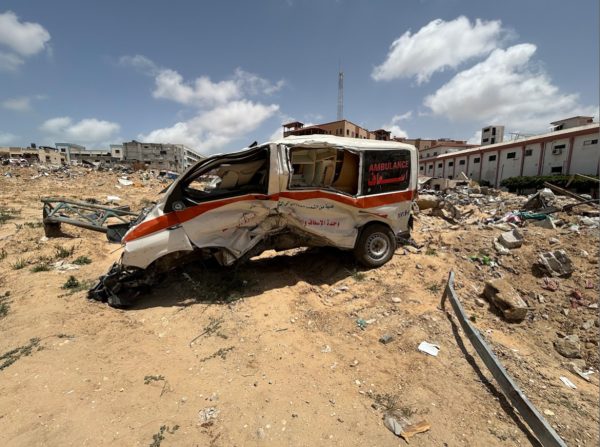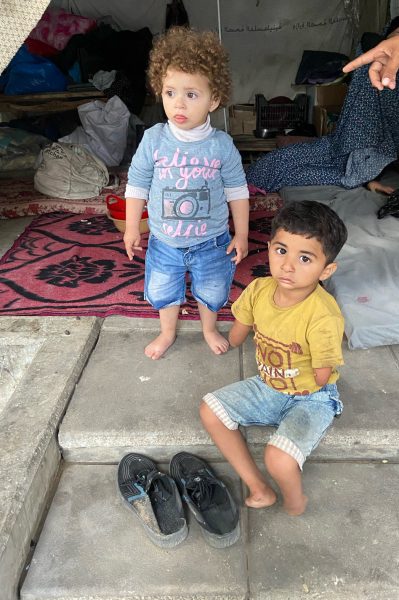Inside the country of Palestine, bombs are heard blasting in the background. Beyond the walls of the hospitals, families are spotted taking refuge while prayers are being held and medical operations are being done.
The Israel-Palestine conflict has resulted in injuries for many citizens. From blast injuries to gunshot wounds, medical professionals have worked to help save many lives.

A group of medical professionals went with Fajr Scientific to help the Palestinians with war injuries. Fajr Scientific is an organization dedicated to helping people in need providing services in many different areas.
“We envision a world where top-notch surgical expertise is a right, not a privilege. We bridge the gap between medical advancements and those in need, ensuring no one feels helpless due to a lack of surgical care,” according to the mission statement of Fajr Scientific.
From April to May 2024, many professionals set out to help the people of Palestine. Orthopedic Surgeon Umar Burney recounts the first things he did once he reached the site.
“I believe we went to the safe house first, and later on, we went to the hospital and walked the hospital and got a formal tour of the hospital,” Burney told Spark.
Burney has been practicing medicine for nearly 18 years, and he primarily works in Dallas, Texas.

Another medical professional on the trip was emergency trauma critical care nurse, Abeera Muhammad. She earned a master’s degree from the University of Texas (UT) in Arlington and now practices in Dallas, Texas.
Muhammad reported that he safe house ran on solar energy and there was no energy at night. The water supply was sporadic and while there was running water, it was only cold.
The safe house was not the living situation for the entire trip. On May 10, 2024, they unexpectedly had to evacuate due to bomb threats in their neighborhood. This forced everyone to move out and sleep on the hospital floors.
“Food was kind of sporadic,” Muhammad told Spark. “Sometimes there was flour to make bread. There were no vegetables, fresh meat, food, or fresh fruit. It was almost always canned food that we ate.”
The medical professionals worked at the European General Hospital, located in South Gaza. According to Muhammad, the hospital itself was moderately sized but operated beyond capacity. In the ER (emergency room) there were about 25 beds and about 400 inpatient beds. The ER staff saw around 600 patients a day. Thousands of people took shelter in or around the premises due to displacement. The number of patients in the hospital was overwhelming to Muhammad.
“We [the medical professionals] were very dehydrated. We experienced a little bit of malnutrition while we were there. We all lost 10 to 15 pounds [in about two weeks],” said Muhammad. “That is a very, very small fraction of what Palestinians have been experiencing for over a year.”
Muhammad said the Palestinians have experienced different kinds of injuries ranging from gunshot wounds, blast injuries, acute trauma, and more.
“We saw a lot of lower extremity injuries, blast injuries. General surgeons are probably taking care of more of the chest wounds and the abdominal injuries,” board-certified spinal surgeon, Mohammad Khaleel, told Spark.
Khaleel completed his residency at UT Southwestern in Dallas. Later, he went on to complete a Harvard fellowship. He has been to the West Bank and Pakistan for medical missions in the past.
According to Khaleel, having witnessed destruction and injuries on his medical missions, certain cases stick with him. One of these cases was a five-year-old boy in Palestine named Amir.
“He had to have his hands and his arms above his elbow and both of his feet amputated so he had no limbs,” said Muhammad.
Muhammad also said that Amir’s mother inhaled phosphorus while she was pregnant because of a phosphorus bomb nearby. This caused Amir to have birth defects when he was born.
Burney, Muhammad, and Khaleel all noted the resilience of Palestinians. “They’ve been able to sustain themselves and persevere through the extreme hardship that they’ve been through,” said Burney.
Muhammad said Palestinians have remained strong, even through hardship after hardship. “The amount of resilience they have is super inspiring and amazing,” said Muhammad. “They responded with such patience and such beautiful character.”
Khaleel also notes that the healthcare professionals who live in Palestine show their strength in the number of hardships they see and experience daily.
“The healthcare workers are always keeping their cool and as bad as the injuries are, the sound of bombs going off in the background, they never lose their composure,” said Khaleel.
When leaving Gaza, Khaleel said it was challenging. “Leaving Gaza was very difficult because you kind of have survivor’s guilt for leaving these people that you met and going back to the safety of the States,” said Khaleel.
Doing these types of missions reminds Khaleel of why he became a surgeon. Burney also reflects on the impact of the mission.
“I think it’s given me a completely different perspective on life in general, and the ability to give back to people,” said Burney.
According to Khaleel, Burney, and Muhammad, they all felt truly impacted by their time spent. Each of them saw many families lose their homes and how they dealt with these challenges.
“I went to serve them [Palestinians], and I thought I was going to go to help them, but really they helped me, and they showed me what true resilience is,” said Muhammad.
This story was originally published on Spark on January 13, 2025.



































